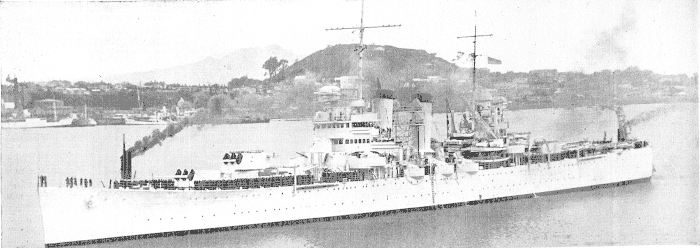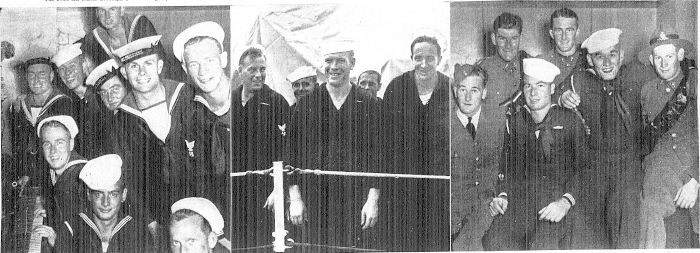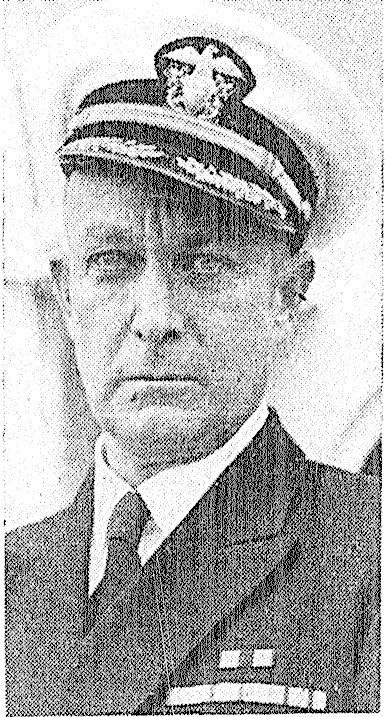Post by Dave Homewood on Sept 5, 2016 1:36:44 GMT 12
This is very interesting, a US Navy fleet of six ships visited Auckland in March 1941. This seems very unusual considering New Zealand was at war and the USA was a neutral country. Was it normal for a neutral nation's Navy to steam around a warzone into the ports of belligerent countries?
The following photos and cartoon appeared in the New Zealand Herald on the 19th of March 1941:
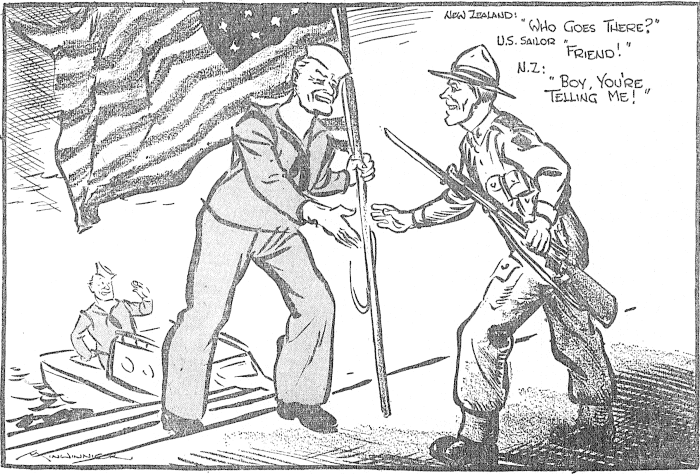
This was entitled "WELCOME!"
OFFICERS AND MEN OF AMERICAN SQUADRON ACCLAIMED IN AUCKLAND PARADE
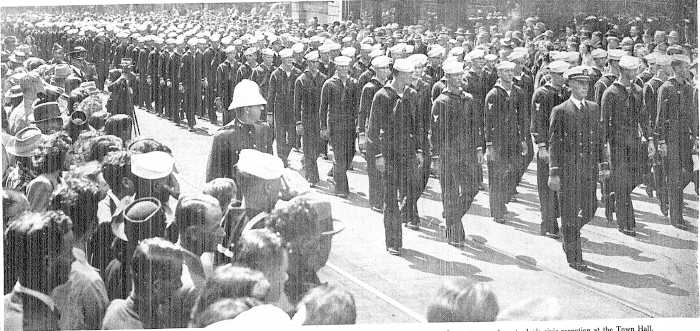
Crowds in Queen Street cheered as 250 officers and men, representing the six visiting warships, marched from Quay Street to attend the civic reception at the Town Hall
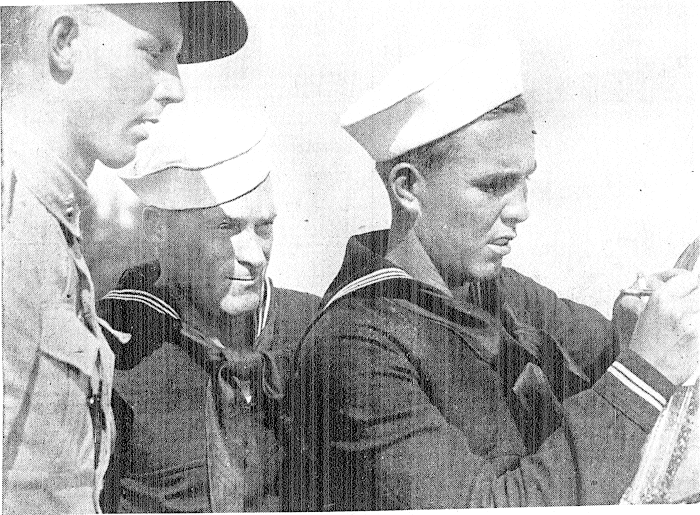
An American sailor writes his address fo a New Zealand soldier during the visit to Papakura camp
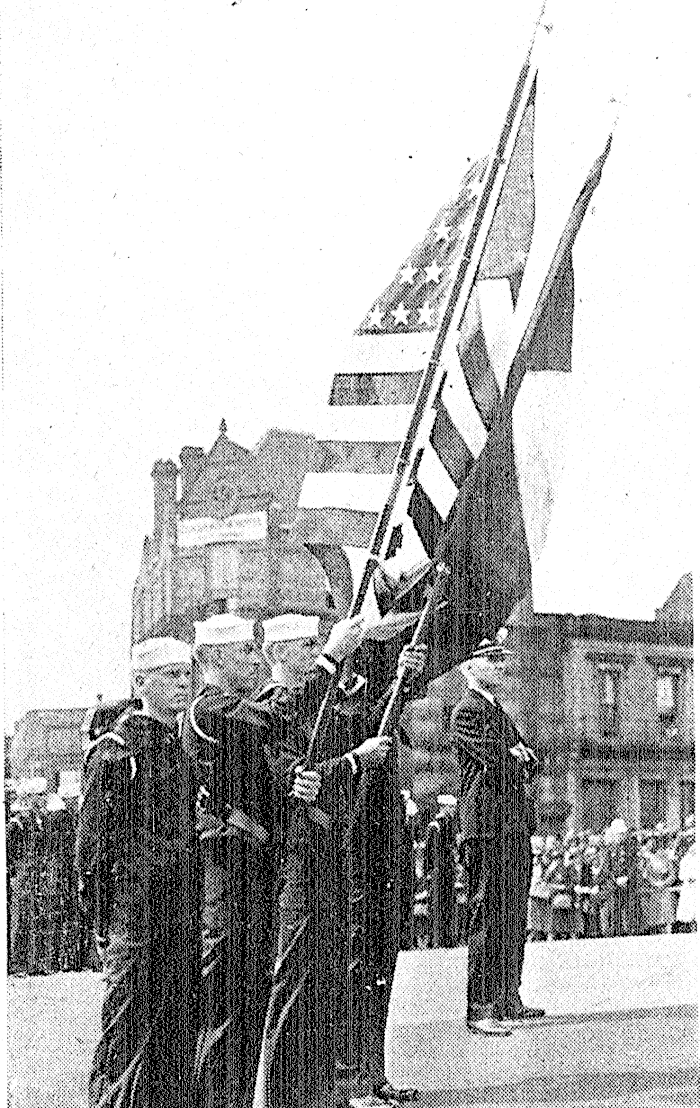
The Colour Party who led yesterday's March
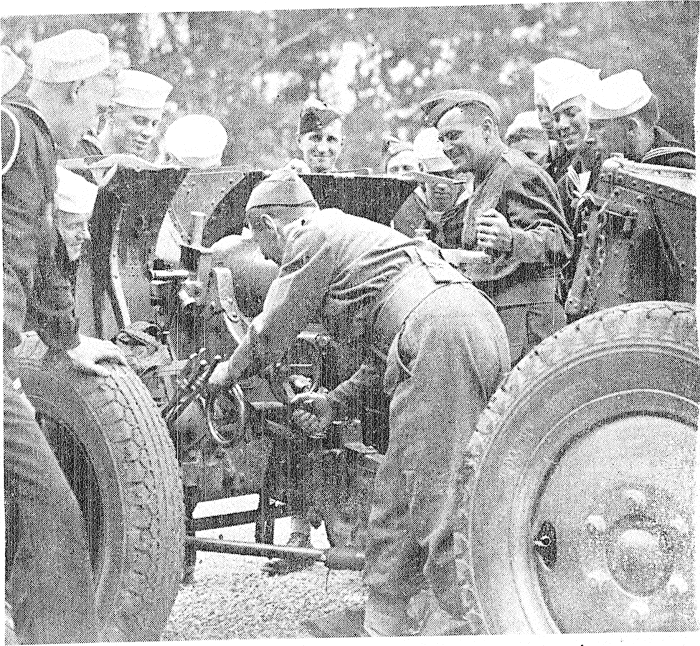
Sailors who visited Papakura military camp inspecting a howitzer
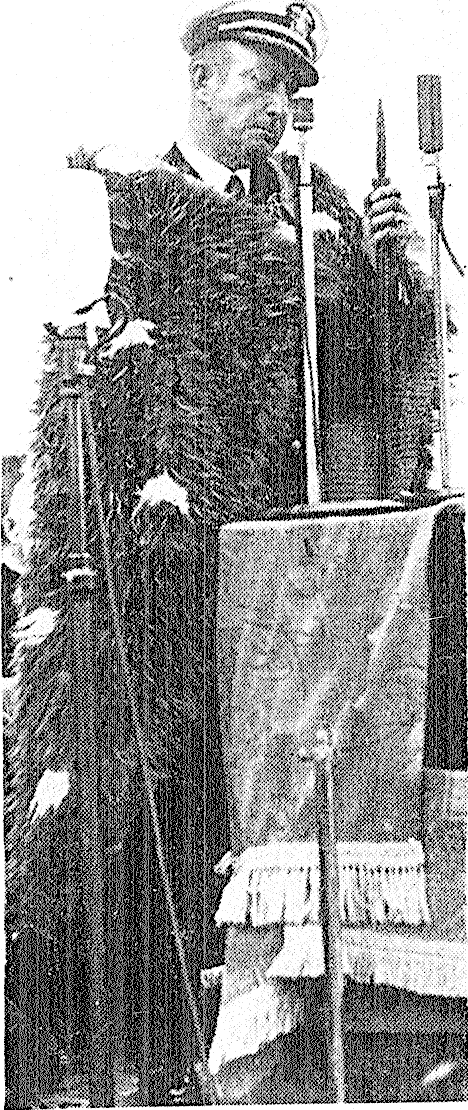
Captain Ellis S. Stone wearing the kiwi mat presented to him at the civic recepton
And these articles which make really fascinating reading
___________________
SALUTE TO AMERICA!
"With heart and voice," Aucklanders spoke for all New Zealand yesterday in their fervent welcome of the American sailor visitors. Not that there had previously been any standing on ceremony, awaiting the march of formal entry and the civic ceremony. From the moment the Americans stepped ashore from their brave ships on Monday, they had with one accord been given the freedom of the city and adopted as friends and brothers.
"Wholly spontaneous," the welcome is, as Captain Stone described it, and he can be assured it is as sincere, unqualified and universal as it is spontaneous. The ceremony at the Town Hall yesterday was therefore no more than the formal ratification of the treaty of abiding friendship informally and freely concluded already between Americans and Aucklanders in their entente most cordiale. Such would have been the nature of New Zealand's reception to the American Navy at any time, but something deeper is added because this for us is wartime. The Americans have shown themselves more than fair weather friends; they have arrived when the international weather is foul. They are visiting the naval base of a belligerent country and they have arrived in force. There is no need to point out what is implied on either side. President Roosevelt has not been content with making a gesture; he has created a naval fact.
That fact should be enough to go on. Yet his audience heard Captain Stone with interest and understanding when he recalled that 33 years ago President Theodore Roosevelt, "with prophetic vision," had taken the lead in bringing about closer relations between the United States and the British Empire and had chosen the American Fleet as the main agent of goodwill. To that opening, Captain Stone added a remark as quizzical as it was adroit: "I am no longer a young man and my memory is not as good as it was, but if I remember rightly that cruise was also a 'training cruise.' "
The words in themselves do not say much but convey a wealth of meaning. No one would ask Captain Stone to elucidate, nor is there any need. His President and commander-in-chief has proclaimed where America stands and what she is doing with deadly clarity and all the force residing in the great nation he leads. So lately as Sunday Mr. Roosevelt's clarion tone was heard as he declared America's high resolve and that, to meet the danger, "our democracy has gone into action."
On behalf of the United States, he proclaimed "the end of compromise with tyranny and the forces of oppression"; he called for "a total effort" and sacrifices "for common national protection and welfare, for our defence against the most ruthless brutality in history, for the ultimate victory of the way of life now so violently menaced"; he appealed for national unity "until our victory is won."
Thus the President makes common cause with us, joins America's defence with ours, identifies America's victory with our success. The United States has become the ally of the British Empire, in fact if not yet in form. So the American sailors on their "training cruise" can be welcomed as allies as well as friends.
In his message to the Prime Minister, Captain Stone speaks of the two peoples being bound by the ties of common blood and common interest.
Whittier had said before him: We too are heirs of Runnymede, And Shakespeare's fame and Cromwell's deed.
Mr. Roosevelt reduced this sentiment to the terms of vital and immediate interest when, on December 29, he asked the American people: "Does anyone seriously believe that we need to fear attack anywhere in the Americas while a free Britain remains our most powerful neighbour in the Atlantic?" But if Britain went down, he added, "all of us, in all the Americas, would be living at the point of a gun."
Sense therefore chimes with sentiment and interest coincides with inclination, in the defence of a common tradition, a free way of life, and a rich, material heritage. Mr. Roosevelt has translated the logic of the case into vigorous and i resolute action. Captain Stone, his officers and men, and his six fine ships, are an earnest of America's practical mood and her power to act. To those who have come as friends, kinsmen and virtual allies, we say: "Americans, we salute you!"
___________________
SAILORS' RATIONS
VISITING WARSHIPS
A VARIETY OF FOOD
LARGE LOCAL ORDERS
Investigation into the question of what the Navy eats seems to reveal that in the case of the American visitors it is not only varied, but quite a lot. In addition to normal supplies needed by British naval vessels and overseas ships, the United States warships have placed orders around the city for goods of a more national flavour, such as frankfurters, sweet corn, grapefruit and coffee, which are producing a mild boom among leading wholesale and retail firms. Although dismissed by one of the city's main suppliers as nothing out of the ordinary, a list of tenders for meat revealed that this commodity is by no means as despised as one might think. The requirements included 17,000lb. of beef, 1300lb. of pork loins, 1250lb. of pork sausages, and 4150lb. of veal.
Demand for Turkey
About 1000lb. each of luncheon meat and frankfurters did not seem so large, but 4250lb. of chicken and 2220lb. of turkey, the latter almost unobtainable in such quantity, revealed another side of the question of supply. Smoked bacon and ham required totalled over 8000lb.
Figures soared in the vegetable section, where 110 less than 52,500lb. of potatoes was sought, a demand which would have been much appreciated earlier in the season. Ninety sacks of cabbages, 180 boxes of lettuce, and 500 bundles of celery added to the rush in city stores getting over two tons of onions and a ton and a-half of tomatoes down to the wharves in time.
The ratings will be disappointed that supplies are not equal to the demand for 3100lb. of corn cobs, 1900lb. of white turnips and 300lb. of green peppers, but a ton each of carrots and kumaras, and over half a ton each of pumpkins and cucumbers should assure that none will starve.
Oranges and Ice Cream
The troubles of the Internal Marketing Division have been increased by the demand for fruit, an order for 14,550lb. of oranges straining its stocks without taking into account current needs. A total of 12,050lb. of apples should be more easily supplied, but 41641b. of grapefruit will probably be too large an order to be filled locally. Bananas do not seem so popular, less than 200lb. being mentioned.
In a miscellaneous class may be mentioned 5540 dozen eggs, 3540lb. of butter and 1150lb. of cheese, as well as 600lb. of fish, but whether these and other orders are intended as port rations for the 2300 personnel or as part of a more permanent stock is not clear.
In the case of ice cream, which is being sent on board at the daily rate of 50 gallons a ship for the larger vessels and from 25 to 40 gallons for the other units, the supply is stated to be merely a port measure, as it is wished to give members of the crew as much liberty as possible. Ice cream is a regular issue in the United States Navy, all ships having facilities for making it. The ration is about a seventh of a quart a day, equal to a 6d carton as sold in Auckland.
The following photos and cartoon appeared in the New Zealand Herald on the 19th of March 1941:

This was entitled "WELCOME!"
OFFICERS AND MEN OF AMERICAN SQUADRON ACCLAIMED IN AUCKLAND PARADE

Crowds in Queen Street cheered as 250 officers and men, representing the six visiting warships, marched from Quay Street to attend the civic reception at the Town Hall

An American sailor writes his address fo a New Zealand soldier during the visit to Papakura camp

The Colour Party who led yesterday's March

Sailors who visited Papakura military camp inspecting a howitzer

Captain Ellis S. Stone wearing the kiwi mat presented to him at the civic recepton
And these articles which make really fascinating reading
___________________
SALUTE TO AMERICA!
"With heart and voice," Aucklanders spoke for all New Zealand yesterday in their fervent welcome of the American sailor visitors. Not that there had previously been any standing on ceremony, awaiting the march of formal entry and the civic ceremony. From the moment the Americans stepped ashore from their brave ships on Monday, they had with one accord been given the freedom of the city and adopted as friends and brothers.
"Wholly spontaneous," the welcome is, as Captain Stone described it, and he can be assured it is as sincere, unqualified and universal as it is spontaneous. The ceremony at the Town Hall yesterday was therefore no more than the formal ratification of the treaty of abiding friendship informally and freely concluded already between Americans and Aucklanders in their entente most cordiale. Such would have been the nature of New Zealand's reception to the American Navy at any time, but something deeper is added because this for us is wartime. The Americans have shown themselves more than fair weather friends; they have arrived when the international weather is foul. They are visiting the naval base of a belligerent country and they have arrived in force. There is no need to point out what is implied on either side. President Roosevelt has not been content with making a gesture; he has created a naval fact.
That fact should be enough to go on. Yet his audience heard Captain Stone with interest and understanding when he recalled that 33 years ago President Theodore Roosevelt, "with prophetic vision," had taken the lead in bringing about closer relations between the United States and the British Empire and had chosen the American Fleet as the main agent of goodwill. To that opening, Captain Stone added a remark as quizzical as it was adroit: "I am no longer a young man and my memory is not as good as it was, but if I remember rightly that cruise was also a 'training cruise.' "
The words in themselves do not say much but convey a wealth of meaning. No one would ask Captain Stone to elucidate, nor is there any need. His President and commander-in-chief has proclaimed where America stands and what she is doing with deadly clarity and all the force residing in the great nation he leads. So lately as Sunday Mr. Roosevelt's clarion tone was heard as he declared America's high resolve and that, to meet the danger, "our democracy has gone into action."
On behalf of the United States, he proclaimed "the end of compromise with tyranny and the forces of oppression"; he called for "a total effort" and sacrifices "for common national protection and welfare, for our defence against the most ruthless brutality in history, for the ultimate victory of the way of life now so violently menaced"; he appealed for national unity "until our victory is won."
Thus the President makes common cause with us, joins America's defence with ours, identifies America's victory with our success. The United States has become the ally of the British Empire, in fact if not yet in form. So the American sailors on their "training cruise" can be welcomed as allies as well as friends.
In his message to the Prime Minister, Captain Stone speaks of the two peoples being bound by the ties of common blood and common interest.
Whittier had said before him: We too are heirs of Runnymede, And Shakespeare's fame and Cromwell's deed.
Mr. Roosevelt reduced this sentiment to the terms of vital and immediate interest when, on December 29, he asked the American people: "Does anyone seriously believe that we need to fear attack anywhere in the Americas while a free Britain remains our most powerful neighbour in the Atlantic?" But if Britain went down, he added, "all of us, in all the Americas, would be living at the point of a gun."
Sense therefore chimes with sentiment and interest coincides with inclination, in the defence of a common tradition, a free way of life, and a rich, material heritage. Mr. Roosevelt has translated the logic of the case into vigorous and i resolute action. Captain Stone, his officers and men, and his six fine ships, are an earnest of America's practical mood and her power to act. To those who have come as friends, kinsmen and virtual allies, we say: "Americans, we salute you!"
___________________
SAILORS' RATIONS
VISITING WARSHIPS
A VARIETY OF FOOD
LARGE LOCAL ORDERS
Investigation into the question of what the Navy eats seems to reveal that in the case of the American visitors it is not only varied, but quite a lot. In addition to normal supplies needed by British naval vessels and overseas ships, the United States warships have placed orders around the city for goods of a more national flavour, such as frankfurters, sweet corn, grapefruit and coffee, which are producing a mild boom among leading wholesale and retail firms. Although dismissed by one of the city's main suppliers as nothing out of the ordinary, a list of tenders for meat revealed that this commodity is by no means as despised as one might think. The requirements included 17,000lb. of beef, 1300lb. of pork loins, 1250lb. of pork sausages, and 4150lb. of veal.
Demand for Turkey
About 1000lb. each of luncheon meat and frankfurters did not seem so large, but 4250lb. of chicken and 2220lb. of turkey, the latter almost unobtainable in such quantity, revealed another side of the question of supply. Smoked bacon and ham required totalled over 8000lb.
Figures soared in the vegetable section, where 110 less than 52,500lb. of potatoes was sought, a demand which would have been much appreciated earlier in the season. Ninety sacks of cabbages, 180 boxes of lettuce, and 500 bundles of celery added to the rush in city stores getting over two tons of onions and a ton and a-half of tomatoes down to the wharves in time.
The ratings will be disappointed that supplies are not equal to the demand for 3100lb. of corn cobs, 1900lb. of white turnips and 300lb. of green peppers, but a ton each of carrots and kumaras, and over half a ton each of pumpkins and cucumbers should assure that none will starve.
Oranges and Ice Cream
The troubles of the Internal Marketing Division have been increased by the demand for fruit, an order for 14,550lb. of oranges straining its stocks without taking into account current needs. A total of 12,050lb. of apples should be more easily supplied, but 41641b. of grapefruit will probably be too large an order to be filled locally. Bananas do not seem so popular, less than 200lb. being mentioned.
In a miscellaneous class may be mentioned 5540 dozen eggs, 3540lb. of butter and 1150lb. of cheese, as well as 600lb. of fish, but whether these and other orders are intended as port rations for the 2300 personnel or as part of a more permanent stock is not clear.
In the case of ice cream, which is being sent on board at the daily rate of 50 gallons a ship for the larger vessels and from 25 to 40 gallons for the other units, the supply is stated to be merely a port measure, as it is wished to give members of the crew as much liberty as possible. Ice cream is a regular issue in the United States Navy, all ships having facilities for making it. The ration is about a seventh of a quart a day, equal to a 6d carton as sold in Auckland.



